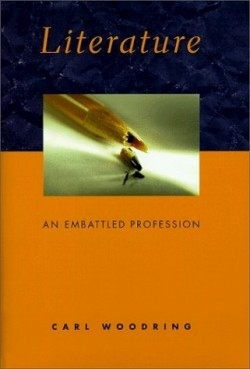It looks like you've stumbled upon a page meant to be read by our code instead of viewed directly. You're probably looking for this page.
Literature
An Embattled Profession
As the future of literature and the humanities at the university level are crucial to the independent thinker, Carl Woodring’s Literature is an important book for those, such as independent booksellers and publishers, whose livelihoods depend on a large audience of well-read, interested readers.
Unlike the recent rash of articles deploring the conditions of employment in academia today—lack of tenured positions, permanent adjunct status, low salaries, top-heavy administrations—Woodring, Woodberry Professor Emeritus of Literature at Columbia University, looks at his field from a historic perspective and ultimately offers positive, constructive, innovative ways to improve the status of the profession. His love for his calling comes through clearly, enabling him to suggest daring changes in his field without any trace of the bitterness so common in contemporary articles on the state of academia in the humanities.
Literature begins with an excellent and succinct history of the university in North America and the development of the humanities—a reminder that universities such as Harvard, William and Mary and McGill were not always bastions of independent thought, but only gradually moved from preparing young men for the ministry to the study of Shakespeare, etymology and Beowulf. Gradually, high-level study of later authors became acceptable until finally, around the time of World War I, it was deemed appropriate for a serious student of literature to concentrate his or her studies (and hers were often barred from fully participating in advanced university study or teaching until the mid-twentieth century) on recent, or even, quelle horreur, living authors.
Woodring then goes on to discuss the development of literary theory, from New Criticism to deconstruction. He talks about various changes in the history of the study of English, from the increase in accessibility of literature due to paperbacks to the influence the free speech movement had on the creation of first-year seminars for freshman taught by senior professors. (They were originally inspired by the university’s desire to limit teaching assistants? access to undergraduates and thus quell the spread of civil unrest.) After establishing that there were no good old days to bemoan the loss of, Woodring suggests steps to improve the current state of the profession.
One of the greatest problems facing the field at the moment is the dearth of tenured positions open to newly trained PhDs. Woodring lays out a plan for modifying tenure so that professors would be encouraged to move on, slowly, to make way for new minds, for the sake of the national intellectual good. He proposes instituting a system of graduated retirement in which housing and healthcare are ensured for tenured professors, along with a minimum salary, while the excess from their former full salary would go to pay a new professor. One does have to wonder at this point how Professor Woodring would feel about accepting such a system, but the idea is an excellent one. Where the cost of keeping the older professor and the newer faculty member would exceed the salary budget, he recommends cutting the number of university administrators, which have boomed in the past few decades.
Woodring then offers his ideas for a radical two-part PhD program: the PhDT for those who want to teach and the PhDL (the L is for Literature) for those who want to do research, pointing out, correctly, that the production of a long, publishable manuscript does not necessarily indicate an aptitude for imparting a love and understanding of literature to undergraduates. He even lays out very specific suggestions, down to reading lists, for prospective college-level English literature teachers. Woodring, who plays a central part in overseeing Columbia College’s core curriculum, a two-year course of readings of great thinkers and writers, also suggests a common course for all undergraduates resembling Columbia’s program.
Flashes of humor shine through even when the author is making some of his most important points. In discussing the qualities committees look for when choosing a new colleague, he gently pokes fun at Harvard’s system of convening a group of colleagues to discuss a particular candidate, saying that the committees often include “professors who find the candidate merely adequate because less remarkably fitted for this position than each of them is. How would you rank this candidate with Sir Isaiah Berlin?…. Has she been observed turning water into wine? If so, how many times?”
As Woodring writes, “The moment for finding common ground is now, when the public media are paying attention to literary study.” Literature is an excellent book to introduce a general readership to the history of humanities and the university as a whole through the smaller angle of English departments and their ups and downs. It should be required reading for nearly every graduate student in the humanities, especially those planning to become professors of literature.
Reviewed by
Celeste Sollod
Disclosure: This article is not an endorsement, but a review. The publisher of this book provided free copies of the book to have their book reviewed by a professional reviewer. No fee was paid by the publisher for this review. Foreword Reviews only recommends books that we love. Foreword Magazine, Inc. is disclosing this in accordance with the Federal Trade Commission’s 16 CFR, Part 255.
